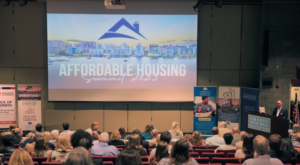In a high-price county that sees young workers leave, summit offers deep-dive into challenges and opportunities.
By Dania Hefley
Original Air Date: Nov. 10, 2023
HOST: Living and working in Sarasota has become an either-or, and the Sarasota Chamber of Commerce is ringing the alarm bells, as housing has become increasingly unaffordable in this area. WSLR reporter Dania Hefley was at an affordable housing summit at Sarasota Memorial Hospital this week – just a few hallways down from the emergency room – which was aimed at reviving local private-sector and government initiatives.

At an event just a few hallways down from the emergency room at Sarasota Memorial Hospital, business players were trying to revive efforts to provide affordable housing. Video still photo: Sarasota Chamber
Dania Hefley: On Wednesday afternoon, the Sarasota Chamber of Commerce was among several groups that hosted an affordable housing summit. At the event, non-profit players, experts, government officials and entrepreneurs shared findings and recommendations for affordable housing in the region.
A recent survey by the Young Professional Group within the Sarasota Chamber reveals the bad shape of the local housing landscape for working people. Out of 540 respondents aged 19 to 40, 96% expressed concerns that escalating housing costs might have adverse effects on the area’s economy. Almost seven in 10 respondents are considering leaving Sarasota due to housing expenses. The survey, conducted online in August 2023, highlights challenges faced by young professionals, with over 51% experiencing housing cost burdens.
Heather Kasten, president and CEO of the Greater Sarasota Chamber of Commerce, began the event by setting a definition for the term.
Heather Kasten: You’ll hear that phrase ‘affordable housing’ multiple times throughout many presentations today. And just as a definition, so that we can all make sure we’re singing off the same sheet of music: Housing is deemed affordable for an individual if it is less than 30% of their gross income.
Jon Thaxton, senior vice president for community investment at the Gulf Coast Community Foundation, began his talk by presenting findings and recommendations by the City of Sarasota and Sarasota County’s affordable housing advisory committee. The latter were approved just a week ago, in a unanimous vote of all members of the city and the county advisory committee.

Jon Thaxton
Thaxton also discussed the key problem facing affordable housing.
Jon Thaxton: The problem is also relatively simple to find. We have an affordable housing demand that far exceeds the affordable housing supply. The solution to affordable housing is making sure that you reduce the deficit that we have today, affordable housing needs, and that we do not exacerbate that imbalance of supply and demand going into the future.
Ali Ankudowich, land-use and planning technical advisor for the Florida Housing Coalition, spoke about how to best respond to a new law the Florida legislature passed earlier this year, the ‘Live Local Act’.
The Live Local Act encompasses a range of policies aimed at addressing affordable housing challenges. These include substantial funding and tax credits, with an allocation of up to $811 million for various affordable housing programs. The act also introduces land-use tools to facilitate affordable housing development in commercial, industrial, and mixed-use areas, among others. It also incorporates tax incentives, including three new property tax incentives and a sales tax exemption specifically designed for affordable housing developments.
Ali Ankudowich: And really, the main message here is that there’s just some additional things to sweeten the pot to make some of these affordable housing developments go.
In a short interview, Jon Thaxton expanded on the reason why affordable housing has become an increasing challenge in the Southeast United States, and specifically in Sarasota. He mentioned fellow speaker Mark Vengroff, managing partner of commercial developer One Stop Housing, and how he has dealt with the issue.
JT: I’m working on two or three deals right now with Mark. And the reason that he is in Manatee County, more so than in Sarasota County, has to do with the availability of properties that fit his mold. A lot of those hotels along the Tamiami Trail in Sarasota County have just simply escalated in value to the point where his model doesn’t work. He’s got a few of them. But it just doesn’t work.
Thaxton gave insight into the real estate market, and why developers are considering neighboring counties for their affordable housing projects.
JT: For One Stop Housing, it’s not so much the jurisdiction, although the jurisdiction does matter. It’s more the real estate market within the jurisdiction that dictates where Mark’s formula will work. And the unfortunate reality for many affordable housing developers in the Southeastern United States, and in Sarasota County, [is] astronomical property values, just take, … you have to buy down the land price and the cost of construction so much in Sarasota County, it makes other counties much more attractive to offer.

Mark Vengroff
Mark Vengroff, managing partner of commercial developer One Stop Housing, dove into the issue of private-sector funding. He talked about how higher interest rates present a significant challenge to many development projects. Elevated interest rates result in lenders requiring a higher Loan-To-Cost, demanding a greater cash investment and thereby reducing overall investor returns. Additionally, lenders now require a higher Debt Service Coverage for affordable housing.
To navigate these challenges, Vengroff outlined a pathway forward. That includes establishing employer-based housing, and engaging in tax-exempt bond deals, particularly with nonprofit organizations. He also proposes leveraging existing buildings and land, forming partnerships with land owners, and collaborating with like-minded, “mission-driven” organizations.
Among the speakers was Steve Hyatt with Resilient SRQ, a local government entity created to channel more than $200 million in federal post-disaster funding to Sarasota County.
Hyatt discussed federal funding opportunities for affordable housing developers, and challenges connected to regulations set by the U.S. Department of Housing and Urban Development. These regulations include ensuring fair wages under the Davis Bacon Act, giving preference for jobs and training to low-income individuals when the project receives over $200,000 in Community Development Block Grant-Disaster Recovery funding, and meeting environmental and construction standards.
Kirsten Russell, vice president community impact for the Community Foundation of Sarasota County, ended the event by thanking the audience and sharing the real purpose for everyone being there.
Kirsten Russell: We just heard a lot of information. Hopefully all of you have learned something. And hopefully there’s a passion point for you within this. And what we’re hoping today is that you take this information, and you do something with it, because we can talk a lot, but we need action. There’s no one person or entity in this room. It’s not the responsibility of the business community alone, the foundation community, our presidents or government, we all come together to create actionable solutions.
This has been Dania Hefley for WSLR News.
WSLR News aims to keep the local community informed with our 1/2 hour local news show, quarterly newspaper and social media feeds. The local news broadcast airs on Wednesdays and Fridays at 6pm.